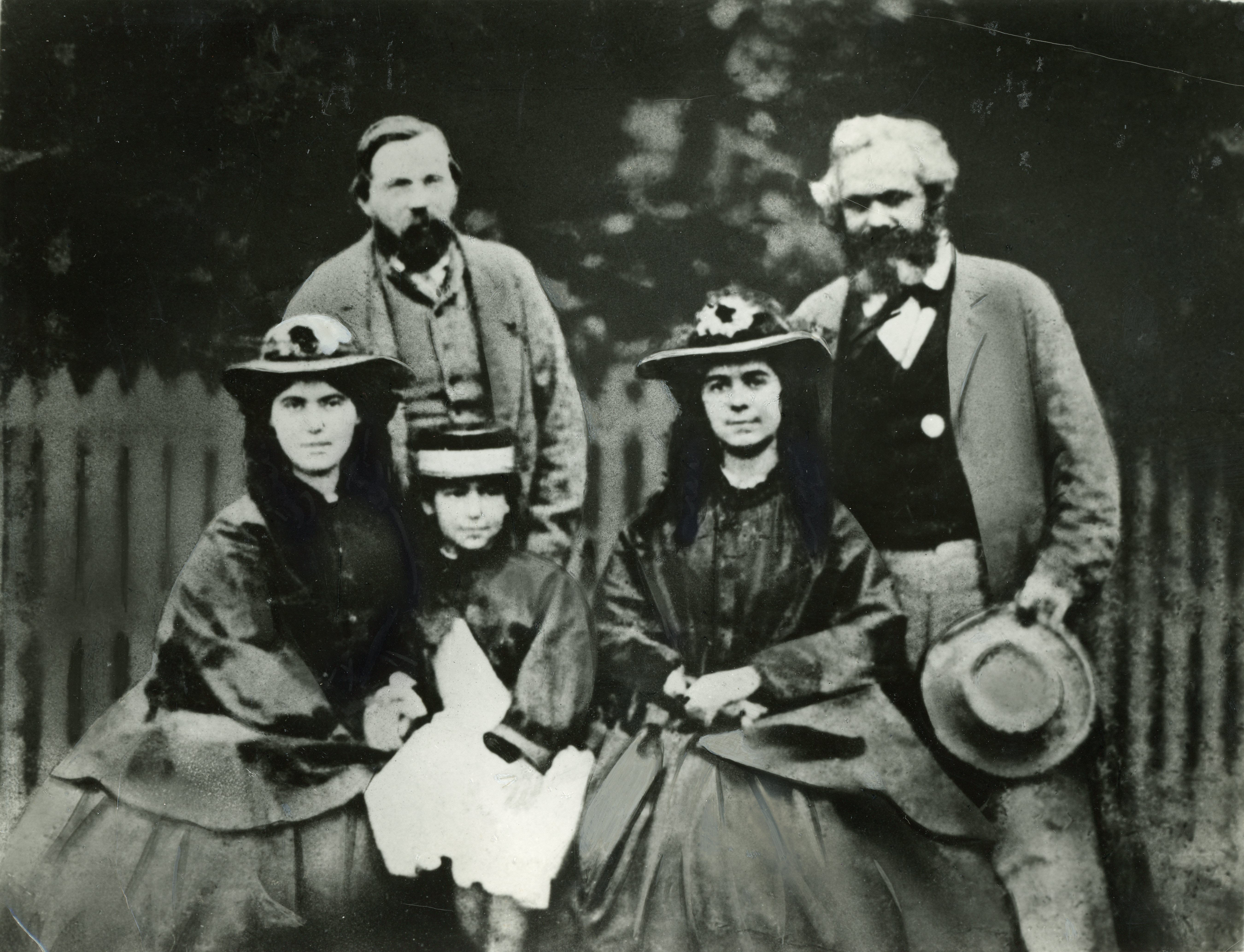A thousand thanks, my dearly beloved Karl, for your long, dear letter of yesterday. How I longed for news of you all during those days of anxiety and sorrow when my heart scarcely dared to hope any more, and how long, how very long, did my yearning breast remain unsatisfied. Every hour contained in itself an eternity of fear and worry. Your letters are the only gleams of light in my life just now. Dear Karl, pray let them shine for me more often and cheer me...
...I am happy beyond words, my dear Karl, that you are still keeping your spirits up and continuing to master your impatience and your longings. How I love you for this courage of yours. You are my husband, and I am still thankful for this! To remain calm and clear-headed in the midst of the hurly-burly and to be in harmony with the times!
Karl Marx was an imperfect man, not in the sense of a humble-brag, but in the manner of which our society still has critiques of him through a lens of traditional masculinity. He wasn't the best provider in an era where that was expected of him. He was impatient, very forward, frequently ill, always working on personal projects, and he was in constant feuds with his comrades. I am not here to sing his praises as the bastion of all good things, but I think it would be good to take stock of the character of the man who set the foundations of this movement in order that we might learn from him.
Marx was first and foremost a humanist. He loved humanity, and despite what unsourced conservative media will tell you, he cared very deeply about the human beings around him:
Marx was a humanist through and through. Nothing was more wonderful to him than man, and he expressed that feeling in a frequently repeated quotation from Hegel: "even the criminal thought of a malefactor has more grandeur and nobility than the wonders of heaven." His answers to the questionnaire made up for him by his daughter Laura reveal a great deal of the man: his idea of misery was submission; the vice he detested most was servility, and his favorite maxims were "nothing human is alien to me" and "one must doubt of everything."
This wasn't just an ideology for Marx, however. In my other posts I have brought up Marx's concept of community (Gemeinwesen), and there is evidence that he lived by his concept of community in his own life, from his political involvement to the way he kept his own household:
Of his political creed, and the tremendous issues that have resulted from it, I have nothing to say. Much indeed has already been said, and the last word is not spoken. It is of his home that I would speak--the man as I saw him in the midst of his family and friends, to whom I talked in the intimacies of every-day life during his last years, and to whom I owe many memories of kindly words and generous hospitality.
This was in the early 'eighties, when as a political refugee, he had found a home in England, and lived in Maitland Park Road; N.W. My introduction to him took place in his own drawing-room at a meeting of a Shakespeare Reading Club, called the 'Dogberry,' of which his youngest daughter Eleanor (Tussy to her friends) was the leading spirit. Amongst the members of this Club were Edward Rose, the dramatist, Mrs. Theodore Wright, whose acting in Ibsen's Ghosts will still be remembered, pretty Dollie Radford, the poet, Sir Henry Juta, Frederic Engels, and others to whom some measure of fame has come. I had been asked to read the juvenile part of Prince Arthur in King John, but the part was an exceedingly small one, and my attention was riveted less on my princely words than on the figure of our host, who sat at the end of the long double room--an extraordinarily forceful and dominating personality...
...These Shakespearean readings were supposed to take place once a fortnight at different members' houses, but as a matter of fact they were held more frequently at the Marx's than anywhere else. Karl Marx, in common with the rest of his family, was a devoted admirer of the poet and loved to listen to his plays. As he very rarely went out at night, the only place he could hear them was in his own house. He never read a part which, for the sake of the play, was perhaps quite as well, for he had a guttural voice and a decided German accent. He was interested in talking of Shakespeare's popularity in Germany and of how it had come about; Eleanor always maintained that the German dramatic ideal approximated much more closely to the English than the French, and waxed eloquent over Lessing and Wieland, who had both done so much to make Shakespeare known in their own country. And, indeed, the 'Swan of Avon' can hardly have had a more passionate devotee than Wieland, who wrote to one of his correspondents: 'I tremble with the deepest, holiest veneration when I only speak his name: I bow down to the earth and pray when I feel the presence of Shakespeare's spirit.'
He loved human art, and culture, and loved sharing his interests with like-minded people. He shared his love with others freely, and frequently had people in his own home. And it's obvious in the writings of Engels, Jenny, and Marx's children that he cared deeply for his family and friends. Most of all, his love for his wife seemed boundless, even until the end of his life:
His whole life long Marx not only loved his wife, he was in love with her. Before me is a love letter the passionate, youthful ardour of which would suggest it was written by an eighteen-year-old. Marx wrote it in 1856, after Jenny had borne him six children. Called to Trier by the death of his mother in 1863, he wrote from there saying he had made "daily pilgrimages to the old house of the Westphalens (in Roemerstrasse) that interests me more than the whole of Roman antiquity because it reminds me of my happy youth and once held my dearest treasure. Besides, I am asked daily on all sides about the former 'most beautiful girl in Trier' and 'Queen of the ball'. It is damned pleasing for a man to find his wife lives on in the imagination of a whole city as a delightful princess..."
From everything I've read on Marx, I see him as an embodiment of the communal man through love of humanity. I can't think of any other reason a relatively privileged middle class person would throw away all of their wealth and political power in favor of principles, working on theory until the end of his life. We can see this, again, in Fromm's description of Marx's idea of man:
For Marx man is characterized by the "principle of movement," and it is significant that he quotes the great mystic Jacob Boehme in connection with this point. [36] The principle of movement must not be understood mechanically but as a drive, creative vitality, energy; human passion for Marx "is the essential power of man striving energetically for its object."
As for how to achieve this, it's hard to say. I don't think we can just git gud and push people into living better lives. There are so many of us managing neurodivergence, poverty, racism, and various other social ills that it's not reasonable to expect everyone to be the image of greatness. Not even Marx was great. What I do think, however, is that not all of us or even most of us are here for selfish aims. Revolutionary thought necessitates a kind of love, I believe. And in most of us it's a very vestigial uncultivated kind of love yearning to grow. But in the end I think we can turn it into community and through community into power.
I'm not sure if Marx would agree with me, but I'd like to end this with another Comyn quote straight from Marx's mouth:
"'It's waste of breath to tell people of their faults, in the hope that the telling will cure them," he muttered, in his guttural tones. "If they would only think--but that is just what they won't do. What is man's greatest asset, the most precious thing that is given him? Time. And see how it is wasted. Your own time --well, that does not matter. But other people's--mine-Himmel! what a responsibility." I looked as I felt--abject. His ferocity disappeared in a charming smile.
"Come, come, you shall be forgiven. Sit down, and I will tell you stories of the days when I was in Paris, and did not know French as well as I know it now..."

 Just be careful with knots that slip or anything that cinches without a guard. These technically count as edgeplay and can cause permanent damage if used incorrectly.
Just be careful with knots that slip or anything that cinches without a guard. These technically count as edgeplay and can cause permanent damage if used incorrectly.



@[email protected]
The bleaching process should take several weeks depending on the starting color. You want to go only one level at a time with a rest period to manage breakage and remoisturize. If you try to do it all at once your hair will turn into jello.
Then when it's near-white you MUST use toner to take out the straw-like color. If you don't do this your dye will come out yellow.
Then you add the silver/white dye as the final step. Re-bleach roots as necessary. Follow instructions on timing for roots or you'll burn your scalp.